Week by week pregnancy guide: 35 weeks pregnant
Here's how your baby is developing...


You're now 35 weeks pregnant but what should you expect? Read week 35 of our week by week pregnancy guide to find out everything you need to know...
You might begin to feel a little uncomfortable, which is normal, so we've put together a guide on what to expect and how to relieve your symptoms if you do start to feel breathless. Here's everything you need to know...
Symptoms at 35 weeks pregnant
You may be feeling breathless as your baby presses into your diaphragm. Ease it by kneeling down on all fours, with your arms at shoulders' width, to free up precious breathing space. You'll notice your Braxton Hicks ‘practice' contractions becoming stronger and making your bump feel hard for a few seconds at a time as they work to tone your womb in preparation for labour.
Your pelvic joints expand thanks to the pregnancy hormone, relaxin, kicking in, along with the weight of your baby.
Some women experience leaking breasts during late pregnancy. To avoid any embarrassing damp patches, invest in some breast pads.
If you have a severe headache, sudden swelling or feel very unwell, call your midwife. It may be a sign of a serious and potentially life-threatening condition of pregnancy known as pre-eclampsia.
Fetal development at 35 weeks pregnant
Your baby is around 45cm and weighs 5lbs. Your baby's digestive system is now developed, as is their central nervous system. Most babies that are born now are likely to survive with no major problems.
GoodtoKnow Newsletter
Parenting advice, hot topics, best buys and family finance tips delivered straight to your inbox.
In 96% of cases your baby's head will now be engaged. If you're expecting twins then normally one will be engaged and the other will fit around it.
Your unborn baby is having sweet dreams! Babies spend 60% of their last three months in the womb in REM - the rapid eye movement phase of sleep which indicates dreaming. It is thought this encourages brain development.
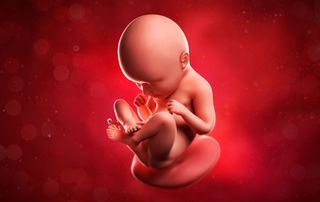
The changes you should make 35 weeks pregnant
Be well prepared! Pack two hospital bags. Even if you're planning a home birth you may end up in hospital. Have one for the labour with facial wipes, drinks, glucose energy tablets, a maternity bra, pads, disposable pants and a babygro for the baby. And one for after your baby is born with changes of clothes for you and the baby, front-opening nighties, nappies, toiletries etc. Keep them by your front door.
Group B Strep (GBS) is a bacteria commonly found inhabiting the human digestive system (and often the vagina of adult women). It is normally harmless, however, it can be passed to newborn babies around childbirth, and in babies who then develop GBS infection, it can be very serious. There is no routine testing for GBS in the UK, but you can arrange a private test. For more information and advice go to Group B Strep Support.

Stephanie Lowe is Family Editor at GoodToKnow covering all things parenting, pregnancy and more. She has over 13 years' experience as a digital journalist with a wealth of knowledge and experience when it comes to all things family and lifestyle. Stephanie lives in Kent with her husband and son, Ted. Just keeping on top of school emails/fund raisers/non-uniform days/packed lunches is her second full time job.
-
 Five categories of grandparent have been identified by psychologists, and we all want number #2
Five categories of grandparent have been identified by psychologists, and we all want number #2Psychologists studying the impact of grandparents in the lives of children have identified five key types, and you'll probably recognise yours instantly.
By Lucy Wigley Published
-
 Millennial dads are doing 4 things better than previous generations, but is it enough to lighten the mother's mental load?
Millennial dads are doing 4 things better than previous generations, but is it enough to lighten the mother's mental load?Millennial dads are definitely doing better than their previous counterparts, but there's still areas they can improve on their parenting to be truly equal to their partners.
By Lucy Wigley Published
-
 Pregnancy week by week guide
Pregnancy week by week guideEverything you need to know when you're expecting
By Stephanie Lowe Published
-
 Week by week pregnancy guide: 32 weeks pregnant
Week by week pregnancy guide: 32 weeks pregnantYour baby is starting to grow very fast...
By Stephanie Lowe Published
-
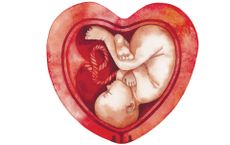 Week by week pregnancy guide: 33 weeks pregnant
Week by week pregnancy guide: 33 weeks pregnantEverything you need to know about being 33 weeks pregnant
By Stephanie Lowe Published
-
 Week by week pregnancy guide: 30 weeks pregnant
Week by week pregnancy guide: 30 weeks pregnantHere's everything you need to know...
By Rosie Conroy Published
-
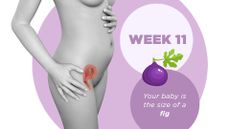 11 weeks pregnant - symptoms, fetal development and what to consider
11 weeks pregnant - symptoms, fetal development and what to considerWelcome to your second trimester...
By Anna Bailey Published
-
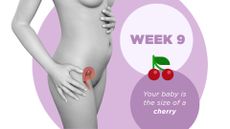 9 weeks pregnant - symptoms, fetal development and what to consider
9 weeks pregnant - symptoms, fetal development and what to considerGreasy hair? Acne? Sickness? Sore boobs? Fatigue? Welcome to 9 weeks of pregnancy
By Anna Bailey Published
-
 Pregnancy calendar: Your pregnancy timeline
Pregnancy calendar: Your pregnancy timelineJust found out you're pregnant? Don't miss out on any important milestones with our guide...
By GoodtoKnow Published
-
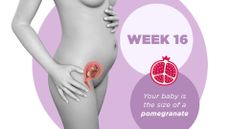 Week by week pregnancy guide: 16 weeks pregnant
Week by week pregnancy guide: 16 weeks pregnantIncluding your baby's development...
By Stephanie Lowe Published